
Brainstorm Security Shop

For Orders Over $199

On Any Of Our Products

Details On Refund Page
Have you ever considered the effectiveness of personal alarms as a tool for self-defense? These devices, often small enough to fit on a keychain, emit a piercing noise that can reach up to 130 decibels, potentially warding off an attacker by attracting immediate attention. While they’re not a physical barrier, their real strength lies in their ability to quickly signal for help in an emergency. But how reliable are they in real-world situations? Consider whether the sense of security they provide is genuine or if there are overlooked vulnerabilities in relying solely on a sound-based defense mechanism.
Personal alarms, designed to enhance your safety, emit a loud sound when triggered to deter potential attackers and alert nearby people. These devices are particularly useful if you’re often in isolated areas or feel vulnerable walking alone at night. They’re simple to use; typically, you just press a button or pull a pin to activate the alarm, which then produces a high-decibel noise.
This noise is meant to startle and scare off an attacker, giving you vital seconds to escape or draw attention. It’s important to remember, however, that while personal alarms can be an effective deterrent, they don’t guarantee safety. They work best as part of a broader approach to personal security that includes being aware of your surroundings and knowing basic self-defense techniques.
You should also consider the legal implications of carrying and using a personal alarm. In most places, these devices are legal, but it’s a good idea to check local regulations to ensure you’re in compliance.
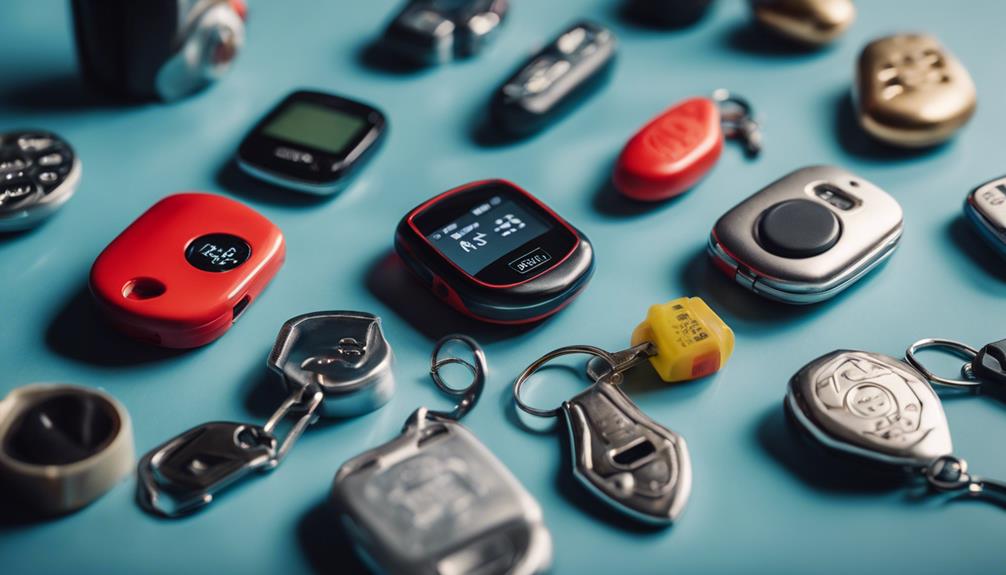
Now that you understand how personal alarms can enhance your safety, let’s explore the different types available on the market.
Personal alarms come in various forms, each suited to different lifestyles and safety needs.
Firstly, there’s the keychain alarm, which you can easily attach to your keys or backpack. It’s handy because you’ll likely have it with you whenever you’re out and about.
Another popular choice is the pendant alarm. Often worn around the neck, this type is ideal for seniors or individuals with health issues, providing a simple way to call for help without needing to reach for a device.
For those who enjoy outdoor activities like running or hiking, wristband alarms are a perfect fit. They’re wearable and usually come with features that make them easy to activate in distress.
There’s also the wall-mounted alarm, typically used in homes and businesses. These are installed at strategic points and can be activated to alert others within the premises or even directly contact emergency services.
Choosing the right personal alarm depends on your personal needs and circumstances. Consider what you’ll feel comfortable carrying and what’ll offer you the quickest way to signal for help.
Understanding how your personal alarm functions is key to effectively using it in an emergency. Essentially, these devices are designed to emit a loud noise to attract attention and deter potential threats when you’re in danger. Here’s a breakdown of how you’d typically use one.
Most personal alarms come with a pin or button. When you pull the pin or press the button, it triggers a loud siren, often reaching up to 130 decibels or more. This sound is comparable to that of a concert or a jet taking off—loud enough to catch the attention of anyone nearby. The idea is to startle and scare off an attacker while simultaneously alerting passersby to your situation.
Your alarm might also have additional features like flashing lights or a voice command option, enhancing its visibility and effectiveness. Some models are equipped with GPS technology, which can send your location to a pre-set contact list or directly to emergency services.
To ensure your alarm is ready when needed, you’ll want to check the battery regularly and familiarize yourself with its operation. Practice pulling the pin or pressing the button, so you’re not fumbling in a critical moment. Remember, the quicker you can activate your alarm, the faster help can arrive.
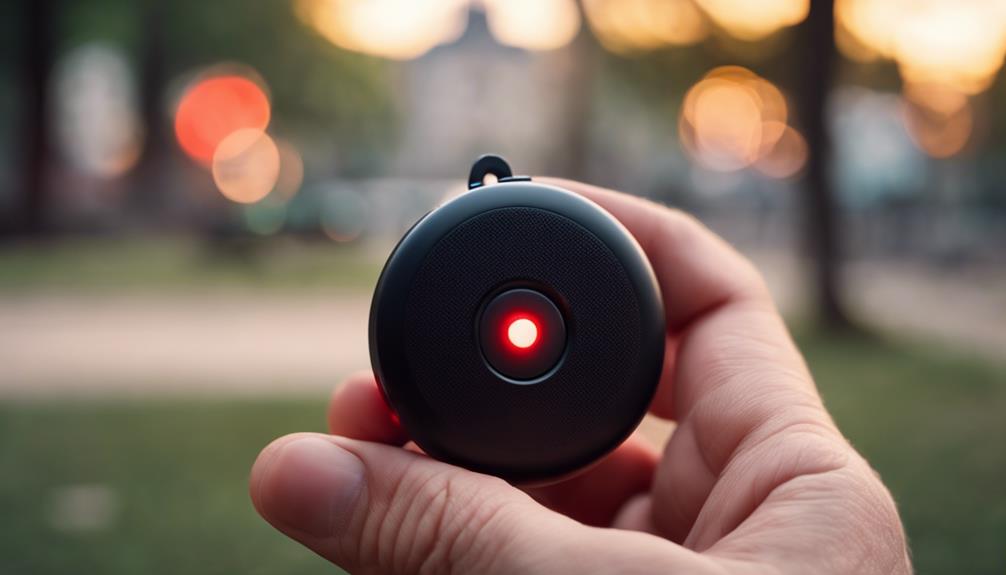
Regarding their role in self-defense, personal alarms can significantly deter assailants and prevent potential assaults. When you’re walking alone at night or through less crowded areas, having a personal alarm at your disposal boosts your safety. It’s not just about the loud noise they emit; it’s about creating an immediate, startling reaction that can disrupt an attacker’s plan.
The effectiveness of personal alarms lies in their ability to draw attention. Once activated, they produce a high-decibel sound that’s hard to ignore. This sound can catch people off guard, making them look in your direction, which is often enough to scare off an attacker who fears being caught. You’re not just protecting yourself; you’re also summoning help from those around you.
Moreover, the simplicity of personal alarms ensures that you can activate them quickly and easily, even in a high-stress situation. There’s no need to fumble through your phone for an app or remember a specific technique. Just pull a pin or press a button, and the alarm does its job. This ease of use makes them a reliable tool in your self-defense arsenal, significantly enhancing your sense of security.
Let’s explore what users have to say about their experiences with personal alarms in real-life situations. Many find these devices incredibly effective in drawing attention during emergencies. You’ll hear stories of joggers deterring potential attackers with a loud, piercing sound, or seniors using the alarm to alert neighbors during a fall.
One user, Sarah, recounts a night when her alarm scared off a mugger in a parking lot. ‘The alarm was so loud, people came out to see what was happening, and the mugger ran off. It saved me,’ she explains.
Another user, John, uses his alarm regularly on his early morning runs. ‘It makes me feel safer knowing I can alert someone nearby if something goes wrong,’ he says.
Feedback on these alarms often highlights their simplicity and ease of use, which is crucial in panic situations. They’re small and portable, making them easy to carry on a keychain or in a pocket. Plus, many appreciate that they don’t require special skills to operate—just a firm press is enough to activate.
These testimonials suggest that personal alarms can be a valuable tool for enhancing personal safety. They provide not just a sound defense mechanism, but also peace of mind.
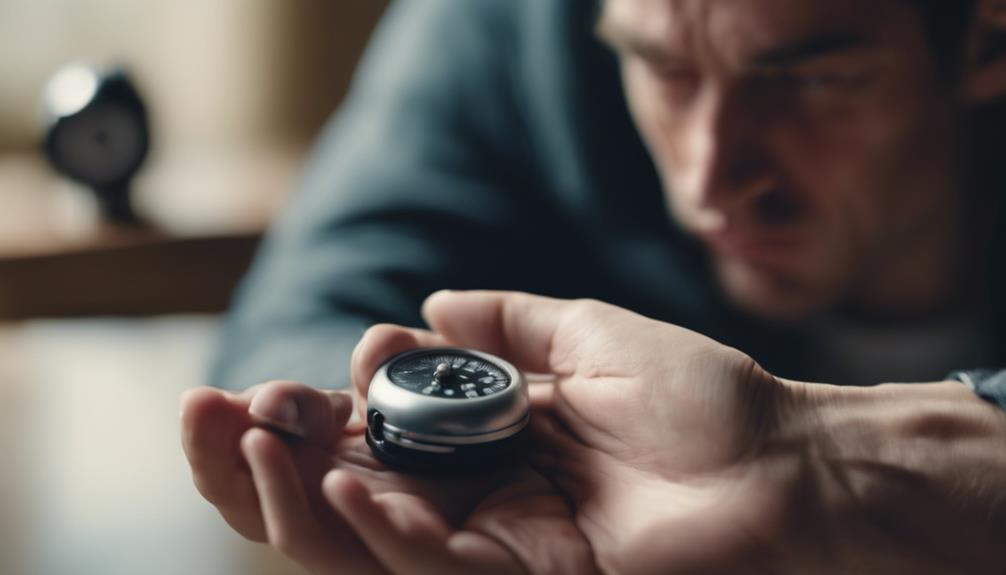
When comparing personal alarms to other safety devices, it’s important to evaluate their effectiveness, ease of use, and portability. You’ll find that personal alarms are exceptionally lightweight and can be effortlessly carried in a pocket or on a keychain. This makes them more portable than many other safety devices, such as pepper spray or a stun gun, which may require more space or special conditions for carrying.
Personal alarms also stand out for their simplicity. With just the press of a button, they emit a loud sound that can deter an attacker and attract attention. This is less complex than using pepper spray, which requires you to aim and can be problematic in windy conditions. Unlike firearms or tasers, personal alarms don’t require you to be close to an aggressor, reducing the risk of physical confrontation.
Furthermore, personal alarms are non-violent and don’t depend on physical strength, making them suitable for all ages and physical abilities. In contrast, handling a stun gun or pepper spray requires a certain level of physical competence and confidence. This inclusivity is a significant advantage, ensuring that anyone can use them effectively in an emergency.
Considering the legal and ethical implications of using personal alarms is essential for ensuring responsible usage. You’ve got to be aware that while these devices are generally legal, the way you use them can sometimes tread into murky waters. For instance, if you’re deploying a personal alarm with the intention to deceive or cause unnecessary panic, you might be violating laws related to public order.
Furthermore, there’s the question of privacy. If your alarm captures audio or video, you’re responsible for how you handle this data. Unauthorized sharing could infringe on others’ privacy rights. It’s crucial you understand the regulations governing recording devices in public and private spaces.
Ethically, consider the impact of your alarm on those around you. It’s designed to draw attention and help in dangerous situations, but excessive or inappropriate use can lead to desensitization, where people start ignoring alarms altogether. You wouldn’t want your safety tool to become ineffective due to misuse.
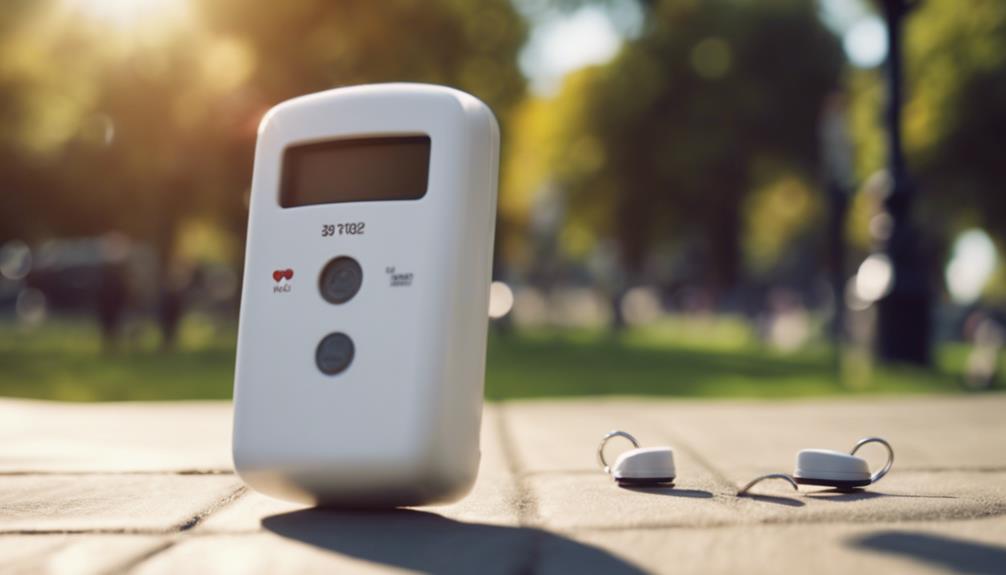
While personal alarms are valuable for enhancing safety, they’ve several limitations that you should consider. Firstly, they rely heavily on sound to deter attackers and alert bystanders, which may not be effective in remote or noisy environments where the sound could go unnoticed. If you’re in a secluded area, the alarm’s noise mightn’t reach anyone to provide the help you need.
Additionally, personal alarms don’t physically stop an assailant. They’re designed to create a distraction or draw attention, but they can’t prevent an attack. This means you’re still vulnerable, especially if the assailant decides to ignore the alarm and continue their aggression.
Moreover, these devices require maintenance. Batteries need to be regularly checked and replaced to ensure they work when needed. If your alarm’s battery is dead, the device is essentially useless.
Lastly, false alarms can be a significant inconvenience. Accidental activation can cause panic and confusion, which might deter you from using the alarm altogether out of fear of setting it off by mistake again.
It’s important to keep these limitations in mind when you’re depending on a personal alarm for your safety.
To maximize your personal alarm’s effectiveness, regularly test its functionality and replace batteries as needed. Ensuring it’s working properly can be the difference between safety and vulnerability.
You should familiarize yourself with its features; understanding how to activate and deactivate it quickly is crucial in an emergency.
Always carry your alarm in an accessible spot. Don’t bury it in your bag—time is of the essence when you’re under threat. Instead, attach it to your keychain, belt loop, or somewhere similarly easy to reach. You’ll want to be able to trigger it without looking.
Educate yourself about your alarm’s sound level. Most emit a loud noise that can disorient an attacker and attract attention from others. However, it’s important to know just how loud yours is, so you aren’t caught off guard. This can also help you determine if the device might need a battery change sooner than expected.
Lastly, don’t rely solely on your personal alarm for safety. Stay aware of your surroundings and avoid risky areas when possible. Combining the use of your alarm with general safety practices enhances your overall security.

As technology evolves, personal safety devices are becoming more sophisticated and interconnected. You’ll soon see products that not only alert you to danger but also predict and prevent potential threats through artificial intelligence (AI).
Imagine your device scanning crowds for known threats or unusual behaviors and notifying you before you’re even aware of the risk.
Integration with other smart technologies means your personal alarms will communicate directly with your home security system, your smartphone, and even local authorities, providing a seamless safety network. You won’t just carry an alarm; you’ll be part of a comprehensive ecosystem that ensures your protection everywhere you go.
Future devices will likely include biometric sensors that can detect physiological changes such as increased heart rate or signs of distress, automatically sending alerts without any manual activation on your part.
This could be a game-changer in situations where you might be incapacitated or unable to reach your device.
The advent of 5G technology will enhance the connectivity and responsiveness of these devices. Faster data transmission will allow for real-time updates and more immediate responses from emergency services, reducing response times and potentially saving lives.
You’re looking at a future where personal safety is proactive, not reactive.
You’ve explored the world of personal alarms, from their types to how they function.
While they can’t physically stop an attacker, their loud siren is incredibly effective at drawing attention and deterring potential threats.
Remember, their effectiveness hinges on proper usage and situational awareness. Always check local laws before using them.
As you stay updated on future safety technologies, consider integrating personal alarms into your safety routine to enhance your security in potentially risky situations.
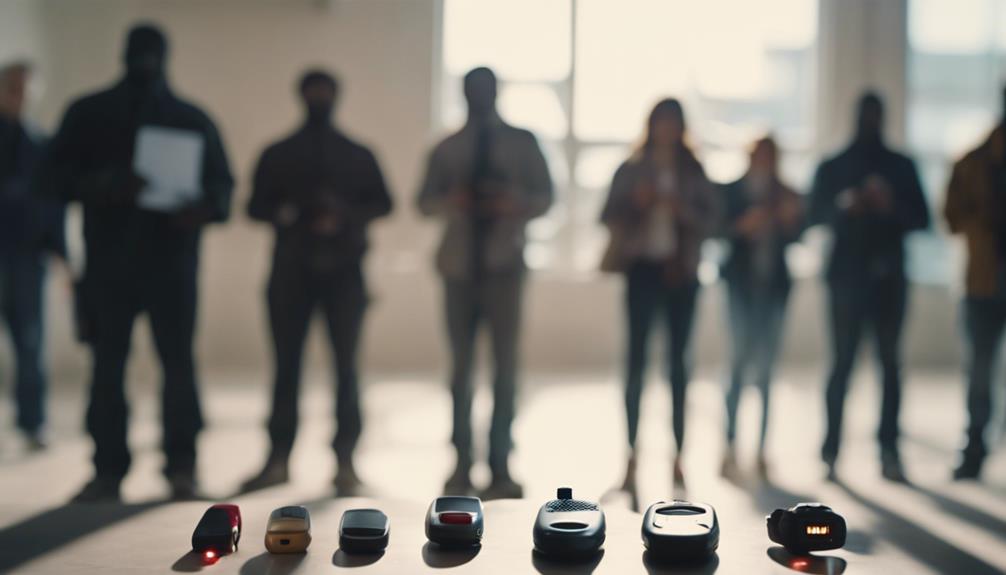
Brainstorm Security Shop
1867 Caravan Trail
Ste 105
Jacksonville, FL 32216
Call us toll free: (800) 859-5566